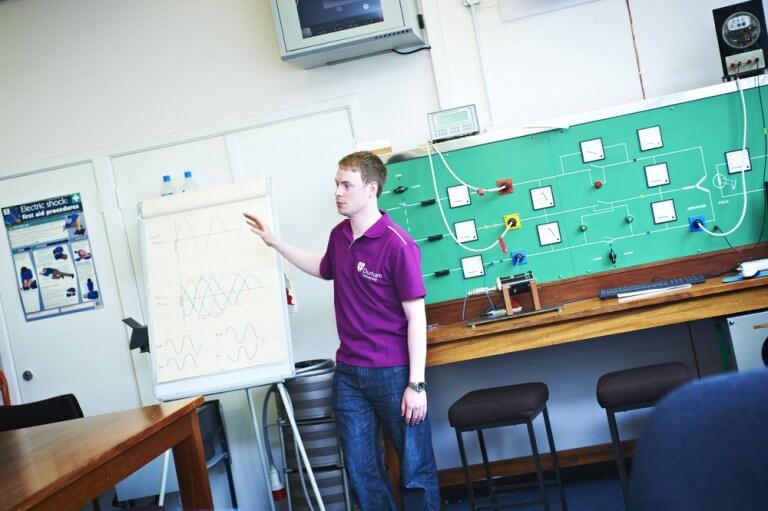
Do you want to be the best in your field? Studying at the Department of Engineering, Durham University will give you the skills you need to become a leading engineer.
You’ll learn the fundamentals of the field, make your own structural designs in teams of international students and carry out your own research and development projects. With the opportunity to study abroad and utilise excellent industry links along the way, you’ll be fully prepared to excel by the time you reach the workplace.
At Durham University, engineering is treated as an integrated subject rather than a narrow subdivision like most universities. Postgraduate engineering programmes at Durham follow a modular system, giving you the chance to choose a number of optional modules on top of your core modules.
This freedom allows you to shape your studies so you can build job-specific skills, follow your interests and find your specialisation. Durham’s one-year postgraduate taught programmes include:
MSc New and Renewable Energy – designed to equip you with the skills required to meet the pressing challenge of achieving energy and environmental sustainability through the application of new and renewable energy technologies.
MSc Electronic & Electrical Engineering – aims to educate you in the key engineering aspects of electronic and electrical engineering, enabling you to undertake responsible, creative, challenging and stimulating posts in industry or research.

Source: Durham University
MSc Civil Engineering – will provide you with an advanced understanding of Civil Engineering through advanced topics such as highways engineering, teaching you to carry out structural design using appropriate design standards and numerical analysis tools, and finally undertaking a major research and development project.
MSc Advanced Mechanical Engineering – will provide you with advanced understanding of Mechanical Engineering through high-quality taught modules on topics such as turbomachinery design, a substantial group design element using sophisticated engineering analysis tools in multinational teams and finally, a major research and development project.
You know your study programme will be cutting-edge, since Durham University is recognised as one of the world’s leading centres of research in Engineering. The department’s interdisciplinary research covers a wide range of topics, divided into three main areas: Future Energy Systems, Next Generation Materials & Microsystems and Sustainable Infrastructure
The scope of the department’s research is expanded even further through participation in cross-faculty Research Institutes, such as Durham Energy Institute and the Institute of Hazard, Risk and Resilience (IHRR).
You will also benefit from the department’s strong focus on strategic partnerships with key industrial organisations – particularly those with whom the department’s research interests overlap, to develop new solutions to pressing societal and technological problems.
For example, it holds a notable partnership with Ørsted (previously named DONG Energy), who have provided funding of £1M to endow a Chair in Renewable Energy. They also have relationships with blue chip engineering companies such as BAE Systems, Rolls Royce, BP and a number of SMEs.
These links to industry will mean you’ll take field trips to factories and engineering sites throughout the year so you can engage with workplaces, learn more about potential career paths and understand how you’ll be applying your studies in the field post-graduation.
The department also benefits from the university’s active Industrial Partnership Committee, which currently has representation from approximately 20 local/national and international companies. The Committee forms a direct link between the department and employers.
The committee ensures students are given the best possible opportunities in terms of industrial placements and graduate employment, which simultaneously means industrial members benefit from strong recruitment opportunities.

Source: Durham University
“The University-Industry relationship is an added advantage for Durham University Students that gives them a chance to partner with a company to work on active projects. For my R&D project I had an opportunity to work with Cummins Engines, Darlington which was a great experience that led me working for Cummins after graduation,” says Balakumar Sriramulu, Product Design Engineer for Cummins.
As well as links to industries in the UK, at Durham you’ll have access to excellent study abroad opportunities, helping expand your understanding of your subject at a foreign university or during a year in industry abroad. You can read more about what Durham students get up to on their exchanges here.
The study experience at Durham is second-to-none with a distinctive collegiate system, over two hundred student union societies and opportunities to get involved in a vast array of Sport, Music, Theatre and Volunteering. The historic city of Durham is open and friendly, complete with a Norman Cathedral and 11th century castle, and just a short train ride from the larger city of Newcastle.
If you’re looking to become an elite engineer through studying relevant and exciting modules at a prestigious university in an historic English city, the Department or Engineering at the University of Durham is the one for you.
Follow Durham University on Facebook, Twitter, YouTube, Weibo, Instagram and LinkedIn
Liked this? Then you’ll love…
The Durham Science and Engineering advantage
This is what it’s like to be an international student at Durham







